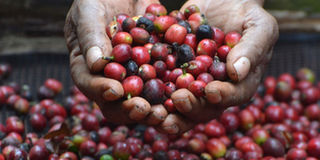Land suitable for coffee, says research

PHOTO | FILE Coffee Research Foundation says Katheri area in Meru County is ideal for Batian coffee variety
What you need to know:
- Pushed by the dwindling area under the cash crop due to real estate boom, research body says region on slopes of Mt Kenya can sustain coffee
The Coffee Research Foundation has found that 2,000 acres of prime land on the slopes of Mt Kenya is suitable for coffee growing. The land in Katheri area, Meru County, borders the mountain and often experiences frost.
Pushed by dwindling farmland under coffee due to demand for housing, CRF researchers have been going round the country looking for suitable land to try and bridge the gap.
CRF coffee nutritionist and soil chemist Joseph Mburu said numerous tests on the soils in the area found it suitable to improve coffee output.
Speaking to farmers during a fact-finding mission, Mr Mburu said the area was ideal for the Batian coffee variety that thrives in all climatic conditions. Developed in 2010, the type is resistant to disease and starts producing berries after one-and-a-half years.
Mr Mburu said the foundation would target 1,000 acres over the next five years, adding that farmers had already been supplied with seeds in readiness for planting when the long rains start.
“Your temperatures are low and the soil depth high. You have the potential to produce high quality coffee. Your proximity to Mt Kenya can give you an added advantage to market your coffee as rain forest certified, which attracts even better prices,” said Mr Mburu.
Pave way for real estate
CRF advisory officer Jonathan Luusa said the foundation was concerned about the growing trend where hundreds of acres under coffee are being alienated to pave the way for real estate.
“Demand for coffee is increasing but supply is decreasing. Many acres of land in places like Thika and Kiambu, where coffee production was high, are being turned into real estate. We are facing a challenge and are trying to replace areas that we have lost to real estate,” he said.
The research was initiated by the Meru Central Coffee Cooperative Union, which invited CRF to collect samples of soil for tests after observing some flourishing but neglected coffee trees in the area.
Union chairman David Gikunda, who spearheaded the initiative, said local residents are mainly people who moved from the coffee hub of Katheri in the neighbouring Meru Central District after buying the expansive land following the coffee boom of the 1970s.
“In the 1970s, coffee had good money. It fetched Sh3 per kilogramme while an acre was being sold at Sh1,300. We have been eager to start growing coffee since we already have the know-how on its husbandry,” said Mzee M’Mwirichia Kiiri.
“I had planted eight stems of coffee which I didn’t even spray or prune. I never thought much about the trees since we didn’t think this cold climate would sustain long- term commercial farming. I used to harvest berries and take them to Katheri, where I have 300 trees,” he told CRF officials who visited his farm, where he plants maize and beans and keeps bees.
Mr Daniel Makathimo said he planted coffee as ornamental trees. “I love coffee because it made me buy this land. Its proceeds have also helped me educate my children. I planted the trees for beauty in 1987. I harvest about 10 kilogrammes per season although I never tended them,” he said.
Mr Gikunda said land under coffee in Meru region has been dwindling due to demand for housing.




